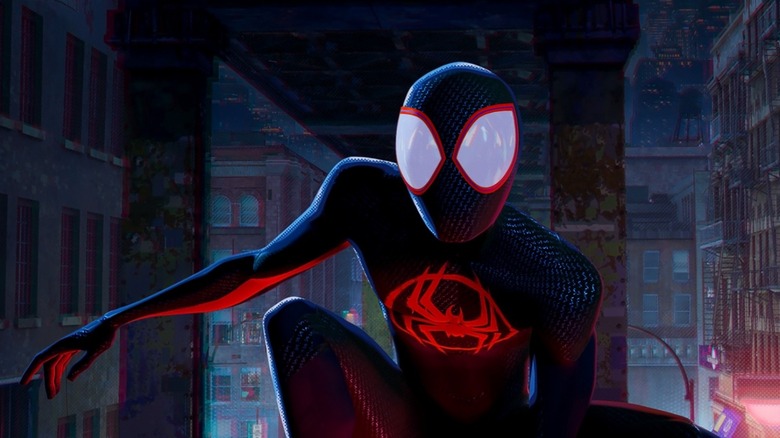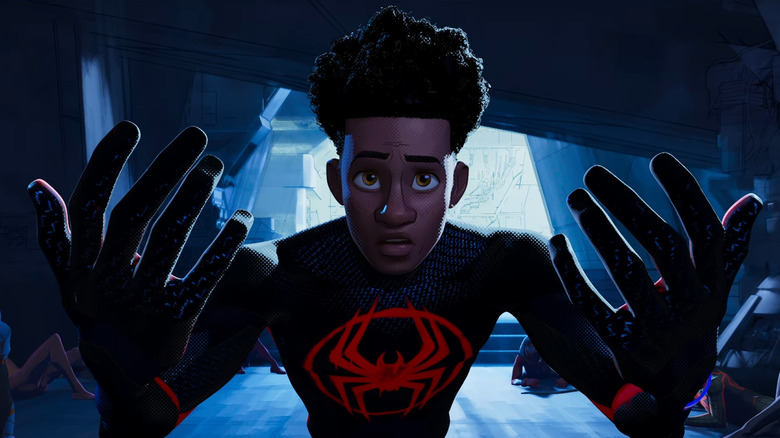How A Hidden Casting Change In Across The Spider-Verse Pays Off The Film's Cleverest Running Joke
This post contains spoilers for "Spider-Man: Across the Spider-Verse."
Miles Morales has truly been one of the greatest gifts to the superhero genre in recent years. When we first meet the character in "Into the Spider-Verse," he is a relatable kid with teenage struggles. However, once he becomes Spider-Man, he immediately stands out as a rare superhero who is taking up the mantle of a hugely popular and known superhero. Miles' struggles with those expectations, in addition to those of being both a superhero and a teenager in general, makes him truly unique.
There's also the fact that Miles is Afro-Latino, the first of his kind in a superhero movie, and that background impacts everything about the character. In "Across the Spider-Verse," which feels like a miracle of a movie, we see Miles' mom get mad at him for getting a B+ in Spanish, and Miles' dad gets mad when someone suggests he is a struggling Black father despite all his professional achievements.
This is a sequel with stunning visuals that break your brain because of how good they are – one that reinvents the wheel, over and over, for both animation and technology. Likewise, "Across the Spider-Verse" delivers the best use of the multiverse in a superhero film and sets a standard for how to apply this concept in the future. Because of the multiverse story, "Across the Spider-Verse" is also filled with so many easter eggs and nods that it becomes impossible to keep up, from hundreds of Spider-People to callbacks to other "Spider-Man" movies, and much more.
Arguably, though, the best little detail in the film is a subtle casting change at the end of the film that pays off a fantastic running joke.
Meet Miles Morales, kind of
In a film full of surprises, there's no bigger twist in "Across the Spider-Verse" than when it suddenly becomes "Back to the Future Part II" and Miles travels to Earth-42, an alternate dimension where there are no heroes, his dad is dead, and Biff is (probably) somehow in charge of things. Unlike Marty McFly, however, Miles does meet an alternate universe of himself, and he couldn't be more different from the Miles we know.
Earth-42's Miles, from his hair to his sneakers, is the polar opposite of our Miles. The biggest surprise with the character, though, is when he introduces himself and correctly pronounces Morales. Throughout both movies, but particularly this one, we see Rio Morales scold her son for not practicing his Spanish enough and for daring to talk in Spanglish rather than pick one language. For her, it's a sign that someone is wrong with her kid; that he is lying to her about something. For Miles, it is but the latest sign that being Spider-Man is just overwhelming him and he is struggling to balance his private life with his superhero life.
Hearing alternate Miles say his last name correctly makes sense. On Earth-42, Miles' father was killed, which means Rio must have raised her son by herself and Miles would be used to speaking only Spanish. In this universe, Rio also speaks more Spanish.
It's a great detail that is very easy to miss, but like everything else in "Across the Spider-Verse," the bit goes deeper — because Earth-42 Miles not only talks and acts differently than our Miles, he's not even played by the same voice actor.
Down the spider-hole
That's right! Earth-42 Miles Morales is not voiced by Shameik Moore. Instead, he's voiced by Jharrel Jerome, who co-starred as teen Kevin in "Moonlight" (a film that, coincidentally, also stars Mahershala Ali, the actor who voiced Miles' Uncle Aaron in "Into the Spider-Verse"). This is one of the more genius choices made in "Across the Spider-Verse." For one, Jerome is actually Afro-Latino, like Miles, so it makes sense for him to pronounce Morales better, signaling how this version of the character is closer to his Latino roots.
But there's even more. You see, Jerome is of Dominican descent. Why is that relevant to the film? Well, early on, when Miles is considering whether or not to tell his parents he's Spider-Man and thinking about how hard it is to keep the secret, we see Rio talk about rumors she's heard of Spider-Man being Puerto Rican. Miles then tries to throw her off his scent by saying he thinks Spider-Man looks more Dominican. So, in Earth-42, Miles is actually Dominican — and has the exaggerated swagger of a Black teen.
Based on its huge cliffhanger ending, it seems "Across the Spider-Verse" has set the stage for its sequel, "Beyond the Spider-Verse" to spend a significant portion of its runtime on Earth-42 with alternate Miles. Casting an actual Afro-Latino actor to better highlight the character's Latino background — if only for a running joke — just goes to show how far the "Spider-Verse" crew is willing to go to make these movies stand out from the rest of the superhero pack.
"Spider-Man: Across the Spider-Verse" is currently playing in theaters.


